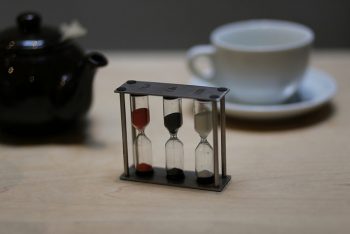Talking About Time in Dutch Posted by Karoly Molina on Jul 30, 2017 in Dutch Language
In the land of agendas and appointments, talking about time is essential. The following are some essential words and phrases you can use when setting up your next appointment.
Hoe laat wil je afspreken?
It is useful to know how to ask at what time you would like to set up an appointment. While your Dutch-learning instinct would suggest you can say wanneer wil je.. (and it is technically not incorrect), the norm is to use the expression hoe laat or how late. Hoe laat wil je koffie drinken?
Om 10 uur
When you want to be precise about the time, om is the word to use. It establishes a specific time you will meet. If you want to talk about a day, you can use op and if you want to talk about a month or a year, use in. Ik wil op vrijdag om 10 uur koffie drinken.
Voor/Na
When you want to make a more casual appointment that doesn’t require a specific time, you can use voor or na. Voor 4 uur means that you would like to do X before 4 and na 4 uur means that you would like to do X after 4. Ik wil na 10 uur koffie drinken.
Rond een uur of 10
If you are not so particular about time, you can use the word rond to mean around a certain time. Rond 10 uur. Another expression you can use is rond een uur of 10 which means the exact same as just rond.
Een kwartier, een klein uur of een dik uur
Now, lets say you are about to leave your house to meet your friend for coffee. You have a few options to express how long you will take.
- If you will meet your friend in 15 minutes, you can say ik ben er over een kwartier. You can also add the diminutive –je to say over een kwartiertje
- If you will be there in 45 minutes, you can say ik ben er over drie kwartier.
- If you suspect it will take you a little under an hour (over 45 minutes but less than an hour), you can say ik ben er over een klein uur or a little hour.
- If you suspect it will take you a little over an hour, you can say ik ben er over een dik uur or in a fat hour.
So now that you are armed with all the time-lingo in Dutch, put out your agenda and try to make an appointments. Hopefully, it will be easier than in the video below.
If I missed any other useful time-related words, please add them on the comments!
Useful Vocabulary
de agenda- the agenda
de afspraak- the appointment
tijd- time (general)
tijdstip- time of day
voor- before
na- after
hoe- how
laat- late
het kwartier- a quarter
het uur- hour
rond- around
klein- little
dik- fat

Build vocabulary, practice pronunciation, and more with Transparent Language Online. Available anytime, anywhere, on any device.





Comments:
Peter Simon:
Hi, Karoly, just a small correction regarding the diminutive after ‘kwartier’: with the diminutive ‘-je’ added, ‘kwartier’, and a number of other words, for that matter, need a ‘t’ in between, so this one becomes ‘kwartiertje’, not ‘kwartierje’. Like ‘uurtje’. Just saying.
An interesting addition to the diminutive. Sometimes it’s even more “complicated”: ‘mol’ becomes the beloved ‘molletje’.
Karoly G Molina:
@Peter Simon Hi Peter, I was trying to avoid the use of “t” with -je to stay on topic of time, but I think it would have been useful to add it. Thank you for your comment! 🙂
Joan:
Hi a related question. The half to the hour method of time telling. I note that the Norwegians also do this. And am wondering if they are the only 2 countries?
Karoly G Molina:
@Joan Hi Joan, I am not sure if other languages also use the half to the hour method. I also speak Italian, Spanish and English and the half time was a new concept. I still have to think about it when I hear half vier. It takes me a moment to figure it out it really is 3:30. Thank you for your comment!
Michele Robinson:
Where would you place the “je” that you left out?
I wondered if “agenda” should be translated as “diary” here?
Karoly G Molina:
@Michele Robinson Hi Michele, my English would tell me diary is more like a notebook where you write about your day and agenda or planner would be where you schedule your appointments. However, this could be a difference in English-speaking regions. I will make the addition to the -je with kwartier so that it is clear. Than you for your comment!
Michele Robinson:
Oh, I see the answer to my first question now.